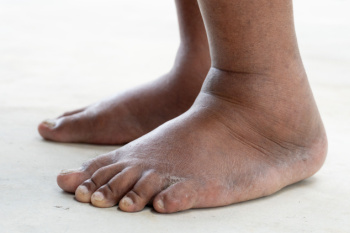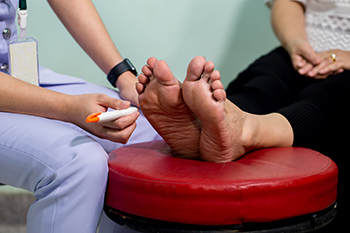Items filtered by date: June 2024
Gout Pain Can Be Managed
Factors and Management of Swollen Feet
 Swelling of the feet, also known as edema, is a condition that results from an abnormal accumulation of fluid in the tissues of the feet and ankles. This swelling can be caused by various factors, including standing or sitting for long periods, pregnancy, or obesity. Injury, or underlying health conditions like heart disease or kidney problems are other risk factors. Swollen feet can be uncomfortable, may restrict mobility, and can make daily tasks difficult to complete. Often, simple changes in regimen, such as elevating the feet, wearing compression socks, staying hydrated, and engaging in regular exercise may reduce the amount of swelling in the feet. If swelling persists or is accompanied by other concerning symptoms, it is suggested to seek evaluation and treatment from a podiatrist to ensure proper management and prevent complications.
Swelling of the feet, also known as edema, is a condition that results from an abnormal accumulation of fluid in the tissues of the feet and ankles. This swelling can be caused by various factors, including standing or sitting for long periods, pregnancy, or obesity. Injury, or underlying health conditions like heart disease or kidney problems are other risk factors. Swollen feet can be uncomfortable, may restrict mobility, and can make daily tasks difficult to complete. Often, simple changes in regimen, such as elevating the feet, wearing compression socks, staying hydrated, and engaging in regular exercise may reduce the amount of swelling in the feet. If swelling persists or is accompanied by other concerning symptoms, it is suggested to seek evaluation and treatment from a podiatrist to ensure proper management and prevent complications.
Swollen feet can be a sign of an underlying condition. If you have any concerns, contact the foot specialists of Podiatry Associates of Belleville. Our doctors can provide the care you need to keep you pain-free and on your feet.
Swollen feet are a common ailment among pregnant women and people who stand or sit for extended periods. Aging may increase the possibility of swollen feet and patients who are obese often notice when their feet are swelling too. There may be medical reasons why swollen feet occur:
- Phlebitis - A condition that causes the veins to become inflamed and can also cause leg pain.
- Liver disease - This may lead to low blood levels of albumin which is a protein. This can cause fluid in the blood to pass into the tissues and several areas of the body can become swollen.
- Heart failure - When the heart doesn’t pump properly the blood that is normally pumped back to the heart can pool in the veins of the legs causing swollen feet.
- Kidney disease - One of the main functions of the kidneys is releasing excess fluid in the body. This type of condition can make it difficult for the kidneys to function properly, and as a result the feet may become swollen.
- Deep-vein thrombosis (DVT)- This is a serious condition where blood clots form in the veins of the legs. They can block the return of blood from the legs to the heart which may cause the feet to swell. It is important to be treated by a podiatrist if this condition is present.
Swollen feet can also be caused by bone and tendon conditions, including fractures, arthritis, and tendinitis. Additionally, there may be skin and toenail conditions and an infection may cause the feet to swell. Patients who take medicine to treat high blood pressure may be prone to getting swollen feet.
Many patients elevate their feet to help relieve the swelling and this is generally a temporary remedy. When a podiatrist is consulted the reason behind the swelling can be uncovered and subsequently treated.
If you have any questions please feel free to contact our office located in Belleville, NJ . We offer the newest diagnostic tools and technology to treat your foot and ankle needs.
Symptoms of Diabetic Peripheral Neuropathy

Diabetic peripheral neuropathy is a common issue for individuals with type 2 diabetes, with nearly half experiencing this complication. This condition arises when prolonged high blood sugar levels cause damage to the nerves, especially in the feet and lower legs. Symptoms of peripheral neuropathy include numbness, tingling, burning sensations, and muscle weakness, which can progressively disrupt daily activities. A significant concern is “diabetic foot,” where the loss of feeling and poor blood flow can lead to ulcers, infections, and in severe cases loss of limb. Diabetic neuropathy also can increase the risk of falls and fractures due to lack of sensation in the feet, impaired balance and reduced coordination. Factors such as smoking, high blood pressure, obesity, and cholesterol issues can further increase the risk of developing this diabetic peripheral neuropathy. Early detection and proper management are of extreme importance. If you notice unusual sensations in your feet or lower legs, especially persistent numbness or pain, it is suggested that you make an appointment with a podiatrist who can conduct a thorough examination and recommend a personalized treatment plan.
Neuropathy
Neuropathy can be a potentially serious condition, especially if it is left undiagnosed. If you have any concerns that you may be experiencing nerve loss in your feet, consult with the foot specialists from Podiatry Associates of Belleville. Our doctors will assess your condition and provide you with quality foot and ankle treatment for neuropathy.
What Is Neuropathy?
Neuropathy is a condition that leads to damage to the nerves in the body. Peripheral neuropathy, or neuropathy that affects your peripheral nervous system, usually occurs in the feet. Neuropathy can be triggered by a number of different causes. Such causes include diabetes, infections, cancers, disorders, and toxic substances.
Symptoms of Neuropathy Include:
- Numbness
- Sensation loss
- Prickling and tingling sensations
- Throbbing, freezing, burning pains
- Muscle weakness
Those with diabetes are at serious risk due to being unable to feel an ulcer on their feet. Diabetics usually also suffer from poor blood circulation. This can lead to the wound not healing, infections occurring, and the limb may have to be amputated.
Treatment
To treat neuropathy in the foot, podiatrists will first diagnose the cause of the neuropathy. Figuring out the underlying cause of the neuropathy will allow the podiatrist to prescribe the best treatment, whether it be caused by diabetes, toxic substance exposure, infection, etc. If the nerve has not died, then it’s possible that sensation may be able to return to the foot.
Pain medication may be issued for pain. Electrical nerve stimulation can be used to stimulate nerves. If the neuropathy is caused from pressure on the nerves, then surgery may be necessary.
If you have any questions, please feel free to contact our office located in Belleville, NJ . We offer the newest diagnostic and treatment technologies for all your foot care needs.
Flip-Flops and the Feet
 While flip-flops may signal the arrival of sunny summer days, they can also pose risks to foot health. These seemingly carefree shoes offer minimal support and protection, potentially leading to various foot problems. The lack of arch support and cushioning in flip-flops can alter the way people walk, causing them to grip the sandals with their toes, leading to strain and fatigue. This altered gait can also impact other parts of the body, potentially causing knee, hip, or back pain. If you opt for flip-flops, choose high-quality leather shoes that offer better support and durability. Ensure they fit well and reserve them for short periods or casual occasions. If you experience discomfort or have issues from wearing flip-flops, it is suggested that you consult a podiatrist for individualized treatment and advice on appropriate footwear choices for optimal foot health.
While flip-flops may signal the arrival of sunny summer days, they can also pose risks to foot health. These seemingly carefree shoes offer minimal support and protection, potentially leading to various foot problems. The lack of arch support and cushioning in flip-flops can alter the way people walk, causing them to grip the sandals with their toes, leading to strain and fatigue. This altered gait can also impact other parts of the body, potentially causing knee, hip, or back pain. If you opt for flip-flops, choose high-quality leather shoes that offer better support and durability. Ensure they fit well and reserve them for short periods or casual occasions. If you experience discomfort or have issues from wearing flip-flops, it is suggested that you consult a podiatrist for individualized treatment and advice on appropriate footwear choices for optimal foot health.
Flip-flops can cause a lot of problems for your feet. If you have any concerns about your feet or ankles, contact the foot specialists from Podiatry Associates of Belleville. Our doctors will assist you with all of your foot and ankle needs.
Flip-Flops and Feet
Flip-flops have managed to become a summer essential for a lot of people. While the shoes may be stylish and easy to slip on and off, they can be dangerous to those who wear them too often. These shoes might protect you from fungal infections such as athlete’s foot, but they can also give you foot pain and sprained ankles if you trip while wearing them.
When Are They Okay to Wear?
Flip-flops should only be worn for very short periods of time. They can help protect your feet in places that are crawling with fungi, such as gym locker rooms. Athlete’s foot and plantar warts are two common fungi that flip-flops may help protect your feet against.
Why Are They Bad for My Feet?
These shoes do not offer any arch support, so they are not ideal for everyday use. They also do not provide shock absorption or heel cushioning which can be problematic for your feet. Additionally, you may suffer from glass cuts, puncture wounds, and stubbed toes since they offer little protection for your feet.
More Reasons Why They Are Bad for Your Feet
- They Slow You Down
- May Cause Blisters and Calluses
- Expose Your Feet to Bacteria
If you have any questions, please feel free to contact our office located in Belleville, NJ . We offer the newest diagnostic and treatment technologies for all your foot care needs.
Surgery on the Small Toes

When it comes to foot surgery, attention often gravitates toward major procedures, like bunion corrections or ankle reconstructions. However, surgeries targeting the smaller toes hold equal significance, addressing various conditions that can profoundly impact mobility and comfort. One prevalent issue necessitating such interventions is hammertoe, characterized by abnormal bending of the toe joints, often resulting from imbalanced foot mechanics or ill-fitting footwear. Left untreated, hammertoes can lead to pain, corns, and difficulty in wearing shoes. Another common concern is claw toe, where the toe bends upward from the joint at the ball of the foot, causing pressure points and discomfort. These conditions may be worsened by genetics, arthritis, or nerve damage. Foot surgery for the smaller toes aims to realign and stabilize the affected joints, relieve pain, and restore function. If you have an abnormal foot structure that is affecting the small toes, it is suggested that you seek the advice of a podiatrist who can determine if surgery is a viable option for you.
Foot surgery is sometimes necessary to treat a foot ailment. To learn more, contact the foot specialists of Podiatry Associates of Belleville. Our doctors will assist you with all of your foot and ankle needs.
When Is Surgery Necessary?
Foot and ankle surgery is generally reserved for cases in which less invasive, conservative procedures have failed to alleviate the problem. Some of the cases in which surgery may be necessary include:
- Removing foot deformities like bunions and bone spurs
- Severe arthritis that has caused bone issues
- Cosmetic reconstruction
What Types of Surgery Are There?
The type of surgery you receive will depend on the nature of the problem you have. Some of the possible surgeries include:
- Bunionectomy for painful bunions
- Surgical fusion for realignment of bones
- Neuropathy decompression surgery to treat nerve damage
Benefits of Surgery
Although surgery is usually a last resort, it can provide more complete pain relief compared to non-surgical methods and may allow you to finally resume full activity.
Surgical techniques have also become increasingly sophisticated. Techniques like endoscopic surgery allow for smaller incisions and faster recovery times.
If you have any questions please feel free to contact our office located in Belleville, NJ . We offer the newest diagnostic and treatment technologies for all your foot and ankle needs.
